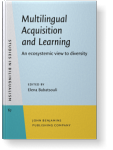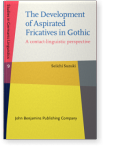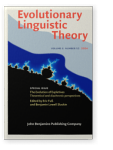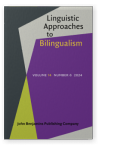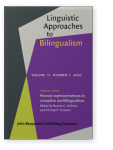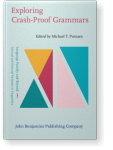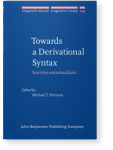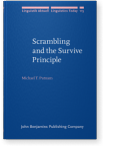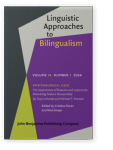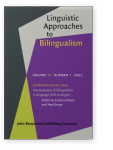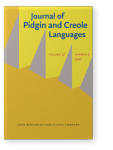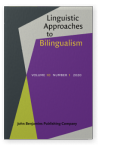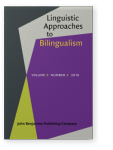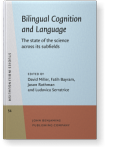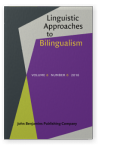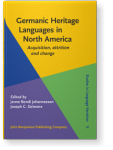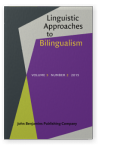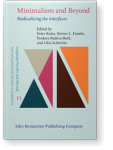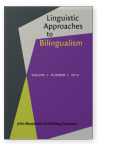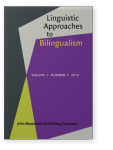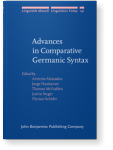Michael T. Putnam
List of John Benjamins publications for which Michael T. Putnam plays a role.
Book series
Journals
ISSN 1879-9264 | E-ISSN 1879-9272
Mental representations in receptive multilingualism
Edited by Bonnie C. Holmes and Michael T. Putnam
Special issue of Linguistic Approaches to Bilingualism 10:3 (2020) v, 132 pp.
Subjects Cognition and language | Cognitive psychology | Language acquisition | Multilingualism | Psycholinguistics | Theoretical linguistics
Studies on German-Language Islands
Edited by Michael T. Putnam
[Studies in Language Companion Series, 123] 2011. xii, 477 pp.
Subjects Germanic linguistics | Historical linguistics | Syntax | Theoretical linguistics
Exploring Crash-Proof Grammars
Edited by Michael T. Putnam
[Language Faculty and Beyond, 3] 2010. xii, 301 pp.
Subjects Generative linguistics | Syntax | Theoretical linguistics
Towards a Derivational Syntax: Survive-minimalism
Edited by Michael T. Putnam
[Linguistik Aktuell/Linguistics Today, 144] 2009. x, 269 pp.
Subjects Generative linguistics | Syntax | Theoretical linguistics
Scrambling and the Survive Principle
Michael T. Putnam
[Linguistik Aktuell/Linguistics Today, 115] 2007. x, 216 pp.
Subjects Generative linguistics | Germanic linguistics | Syntax | Theoretical linguistics
2024 The importance of features and exponents: Dissolving Feature Reassembly Epistemological issue: The importance of features and exponents: Dissolving Feature Reassembly, Flores, Cristina and Neal Snape (eds.), pp. 1–36 | Article
Formal approaches to bi- and multilingual grammars rely on two important claims: (i) the grammatical architecture should be able to deal with mono- and bi-/multilingual data without any specific constraints for the latter, (ii) features play a pivotal role in accounting for patterns across and… read more
2024 Modeling multilingual grammars: Constraints and predictions Epistemological issue: The importance of features and exponents: Dissolving Feature Reassembly, Flores, Cristina and Neal Snape (eds.), pp. 104–114 | Article
2023 What linguistic innovation tells us Epistemological issue: The dynamics of bilingualism in language shift ecologies, Flores, Cristina and Neal Snape (eds.), pp. 51–55 | Commentary
2020 Mental representations in receptive multilingual grammars Mental representations in receptive multilingualism, Holmes, Bonnie C. and Michael T. Putnam (eds.), pp. 309–314 | Introduction
2020 The good, the bad, and the gradient: The role of losers in code-switching Linguistic Approaches to Bilingualism 10:1, pp. 5–34 | Article
Although formal analyses of code-switching have enjoyed some success in determining which structures and interfaces are more fertile environments for switches than others, research exposing recalcitrant counter-examples to proposed constraints and axioms responsible for governing code-switching… read more
2019 Derivational complexity vs. transfer effects: Long-distance wh -movement in heritage and L2 grammars Linguistic Approaches to Bilingualism 9:3, pp. 341–375 | Article
We investigate whether non-target wh-questions in heritage Low German and L2 English speakers are due primarily to cross-linguistic transfer or the reduction of grammatical complexity in developing grammars as modelled by the Derivational Complexity Hypothesis (DCH, Jakubowicz 2005). Previous… read more
2018 Chapter 12. Different situations, similar outcomes: Heritage grammars across the lifespan Bilingual Cognition and Language: The state of the science across its subfields, Miller, David, Fatih Bayram, Jason Rothman and Ludovica Serratrice (eds.), pp. 251–280 | Chapter
The rise of scientific inquiry focusing on bilingualism over the past few decades has also borne witness to an increase in the study of individuals and communities who speak a native language that is not the sociolinguistically dominant language of the environment in which they grew up. While it is… read more
2015 Functional Convergence and Extension in Contact: Syntactic and Semantic Attributes of the Progressive Aspect in Pennsylvania Dutch Germanic Heritage Languages in North America: Acquisition, attrition and change, Johannessen, Janne Bondi † and Joseph C. Salmons (eds.), pp. 135–160 | Article
This paper investigates the extension of the progressive aspect in contemporary Pennsylvania Dutch. The scope of convergence in contact varieties is a debated subject in theoretical linguistics; the most recent and promising research finds that convergence in contact is not a simple one-to-one… read more
2015
In order to elucidate the structure of heritage grammars, this paper presents an analysis of word order variation in Moundridge Schweitzer German (MSG), a moribund heritage variety of German spoken in South Central Kansas. Based on elicited production data and an acceptability judgment task, we… read more
2014 On the need for formal features in the narrow syntax Minimalism and Beyond: Radicalizing the interfaces, Kosta, Peter, Steven L. Franks, Teodora Radeva-Bork and Lilia Schürcks (eds.), pp. 56–77 | Article
In this chapter we pose the non-trivial question regarding the status of functional features (f-features) in minimalist inquiry. This investigation explores whether or not f-features can be considered an essential part of narrow syntactic operations if they can be relegated to some sort of Late… read more
2013
This paper reports initial findings on the apparent loss of passive voice constructions in Moundridge Schweitzer German, a moribund enclave dialect spoken in South Central Kansas. The dialect once had three agent-suppressing constructions; today speakers produce only an impersonal construction but… read more
2013
Modeling the competence grammar of heritage speakers who exhibit low proficiency in their L1 represents a significant challenge for generative and experimental approaches to bilingual linguistic research. In this paper we revisit the core tenets of the incomplete acquisition hypothesis as… read more
2011 Anaphors in contact: The distribution of intensifiers and reflexives in Amana German Studies on German-Language Islands, Putnam, Michael T. (ed.), pp. 111–128 | Article
This paper presents a novel sketch of a research program into the morpho-syntactic/semantic characteristics of intensifiers and reflexives in a moribund Sprachinsel language, Amana German. As demonstrated in this pilot study, Amana German has (apparently) undergone a shift in the syntactic… read more
2011 Why study Sprachinseln from generative or structural perspectives? Introductory remarks Studies on German-Language Islands, Putnam, Michael T. (ed.), pp. 1–10 | Article
2010 Exploring crash-proof grammars: An introduction Exploring Crash-Proof Grammars, Putnam, Michael T. (ed.), pp. 1–12 | Article
2010 Syntactic relations in Survive-minimalism Exploring Crash-Proof Grammars, Putnam, Michael T. (ed.), pp. 143–166 | Article
Survive-minimalism, as developed in Stroik (1999, 2009) and Putnam (2007), argues for a “crash-proof” syntax that is divested of all derivation-to-derivation and derivation-to-interface operations, such as Internal Merge and Transfer. In this paper, we extend our investigations into Minimalist… read more
2009 When grammars collide: Code-switching in Survive-minimalism Towards a Derivational Syntax: Survive-minimalism, Putnam, Michael T. (ed.), pp. 133–168 | Article
This study provides a Survive-minimalist analysis of two issues related to DP-structures in code-switching (CS) grammars: (i) the relationship between determiners and nouns in a DP where each respective lexical item originates from a separate language and (ii) the linearization of… read more
2009 C-agreement or something close to it: Some thoughts on the ‘alls-construction’ Advances in Comparative Germanic Syntax, Alexiadou, Artemis, Jorge Hankamer, Thomas McFadden, Justin Nuger and Florian Schäfer (eds.), pp. 41–58 | Article
In this paper we sketch out an account for an until now undiscussed phenomenon in generative syntax, namely the so-called “alls-construction” in Midwestern American English. In this construction, an s-ending is added to all under certain circumstances. We compare and contrast this construction with… read more
2009 Traveling without moving: The conceptual necessity of Survive-minimalism Towards a Derivational Syntax: Survive-minimalism, Putnam, Michael T. (ed.), pp. 3–20 | Article
